Culture: Humour / Global
Beyond a joke
At a time when it isn’t always easy to see the funny side, comedians from Denmark to Dubai are providing a vital service by keeping us smiling – while making the powerful nervous. We hail these satirists, cartoonists and comics, and find out what makes different nations guffaw.
When did the business of laughter become so serious? Political satire was never an endeavour to be taken lightly – medieval court jesters had their work cut out – but the stakes remain as high as ever. These may no longer be the Dark Ages but, in certain parts of the world, being a satirist can still land you in prison and recent history sadly proves that being a cartoonist can get you killed. The powerful know that humour is a potent weapon, that a mocking guffaw can have more power than a long exposé. That, perhaps, has always been the case. Yet in a society with a short attention span, where entertainment is king, delivering critiques wrapped in amusing one-liners has become an increasingly fundamental tool to make issues matter.
Even away from authoritarian regimes, comedy is often pernicious territory on which different world views clash and both the offenders and offended fiercely stand their ground. In a world polarised by incompatible versions of the truth, irony is an uncomfortable grey area, where intentions are not so easy to decipher. Under the shadow of “cancel culture”, many comedians are either shying away from what they fear might be risky punchlines or feeling emboldened in unsavoury crusades against “political correctness”. But comedy, as with debate, suffers when complexity is lacking and it can’t be improved by simply avoiding the issue. Smart comedy, like smart debate, doesn’t punch down – but in order to be relevant and meaningful, it has to engage.
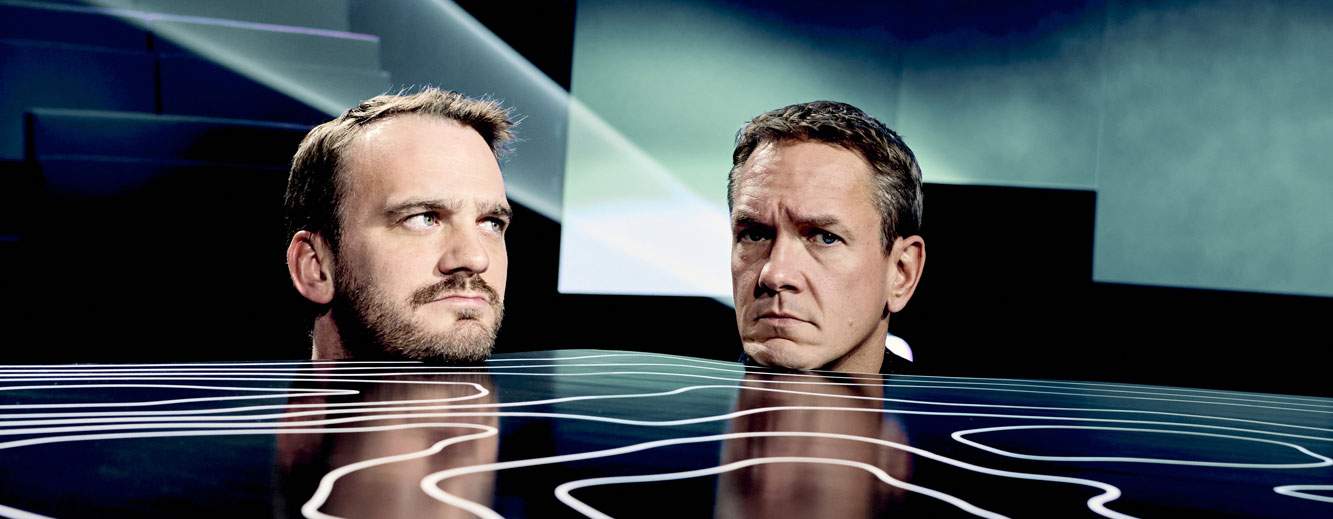
Vincent Veillon and Vincent Kucholl
Switzerland
The civic-minded provocateurs: In a well-functioning democracy where political personality cults are almost unheard of, a duo is finding absurdity in the ordinary.
Can stable, neutral Switzerland ever be funny? Vincent Kucholl and Vincent Veillon (pictured, Veillon on left) think so. “Switzerland might seem functional and it mostly is,” says Kucholl. “But problems arise.” They met in 2009 and later launched current affairs show 120 secondes on radio station Couleur 3. Since then, TV and stand-up slots have followed, with a format that’s always the same: Veillon plays host to Kucholl, who takes on a fictional character, giving his opinion on everything from Art Basel to Swiss trains. The pair have used an array of stereotypes to shine a light on political issues; characters include a big pharma executive and a Swiss-German lieutenant explaining why the army is unavailable during lunch hours.
Their focus on “ordinary” people is fitting in a nation where politicians tend to fly under the radar. “People who work in Swiss politics take themselves less seriously,” says Kucholl. The duo steer clear of political allegiances; instead they try to make social issues interesting – or at least more appealing. “We’re always in pursuit of intelligent laughter or a knowing smile,” says Kucholl.
Ali Al Sayed and Mina Liccione
Dubai
The comedy power couple: Seeking to use humour to bring people of different cultures together, Al Sayed and Liccione reinvented Dubai’s comedy landscape.

Ali Al Sayed and Mina Liccione tied the knot in 2012 but founded Dubomedy, the Middle East’s first comedy school, have been business partners since 2008. Al Sayed is an Emirati Muslim and Liccione is an Italian-American Catholic. Their interfaith marriage is emblematic of a city that people of more than 200 nationalities call home. “Dubai is a place of various identities and ideas,” says Al Sayed. “As comedians, we’re observing. We’re absorbing.”
The audience, he says, is what makes this comedy scene unique. “You won’t find a more diverse and well-informed crowd. You can talk about US and UK pop culture or Bollywood and the audience will get it. People from outside think, ‘What can you say?’ But we can say everything!” Yet there are things that, in reality, cannot be said. Politics, religion and indecency remain off-limits. “Comedians in the uae have a responsibility,” says Al Sayed. “It’s a sensitive region. Steering clear of people’s soft spot, their belief system, is necessary.”
Cancel culture is inevitably creeping in. “Young comedians are overcorrecting their positions,” says Al Sayed, who believes that cancel culture can be both beneficial and dangerous. “Most cultures come from old ways of thinking, believing things that might be racist or misogynistic. I know that because, outside of a small parameter on this planet, my culture is considered ‘bad’. I feel the need to justify myself to white audiences who have decided they know me before I’ve stepped on stage. I’m glad that we’re more conscious about what we say but the idea that we’re unable to evolve endangers everyone.”
As a Muslim comedian in an often Islamophobic world, Al Sayed frequently faces an “answer for your people” mentality when abroad. He points out the absurdity of being “expected to represent everybody, when the Arab world spans several languages and continents”.
New York-born Liccione has used her fish-out-of-water lens to defuse stereotypes about Muslims, with TV specials and short films such as The Shocking Truth About Muslims offering observations that make people both laugh and think. Citing the US’s “Muslim ban” and France’s proscription of the hijab, Liccione says that it’s vital for her to engage in conversations to shift misconceptions. “Sometimes, it makes a stronger impact when [an international] audience hears about this region from someone they can relate to more than, say, Ali,” she says, nudging her husband. “Truth in jest goes a long way. Besides, I’ve been Arabised very quickly. It’s unbelievable how similar our cultures are.”
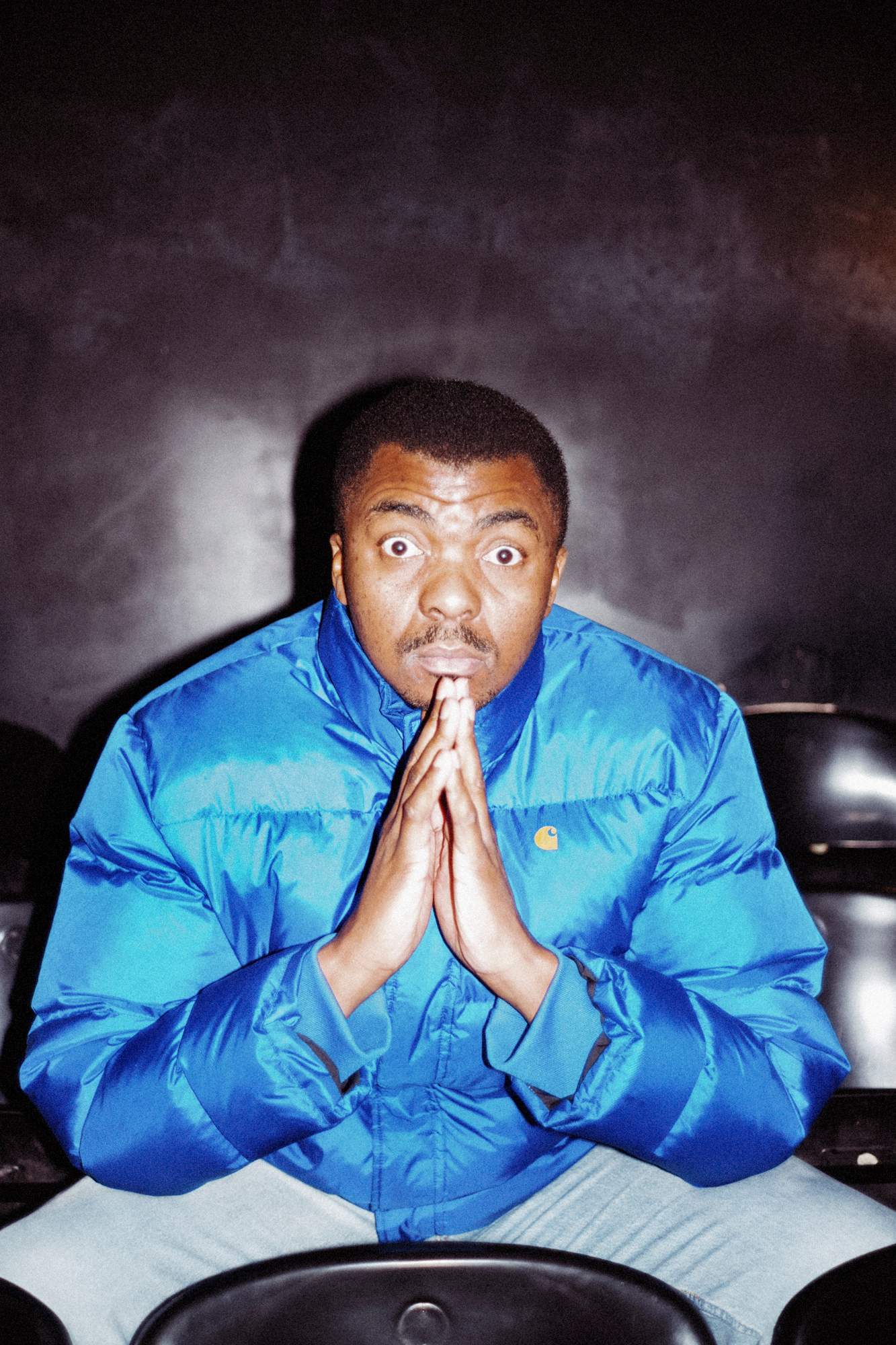
Loyiso Gola
South Africa & UK
The breakout controversialist: The first African comedian to have a one-hour Netflix special, Gola is proving that there’s no subject that is strictly off limits.
Cape Town-born Loyiso Gola might have earned fame across South Africa as the host of the hugely popular satirical talk show Late Nite News, which aired weekly from 2010 to 2015 and was twice nominated for an International Emmy award – but the comedian’s heart lies in stand-up. The format is how he first made a name for himself and where he believes that he does his best work. “I’m a really good stand-up comedian,” says Gola.
If you have watched his Netflix special Unlearning, which was released in spring 2021, you will know that he isn’t just bragging. In the show, while guiding his lanky frame across the stage at contemporary art museum Zeitz Mocaa in Cape Town, he moves seamlessly between controversial, heated topics, ranging from Donald Trump to apartheid in his home country. For Gola, there is almost no subject that is off-limits. Indeed, the more awkward, the better. “A lot of people are scared of discomfort but I relish it,” he says.
Having grown up in South Africa, a country that has had to have more than its fair share of uncomfortable conversations, Gola is fearless but also keenly aware of the weight of his words. “You have the choice of saying whatever you want to say,” he explains. “No one is stopping you but there will be consequences. I enjoy the idea of having to explain every word of my show. Any idea that I put out there, I’ll be able to articulate. I am accountable for what I put out there.”
Gola is the first African comedian to be given a one-hour comedy special on Netflix. With the notable exception of Trevor Noah, who became a household name in the US after taking over from Jon Stewart as the host of The Daily Show, the continent’s comedians remain lesser known on the international stage and opportunities for big deals are still few and far between. “You can’t be a niche comic in South Africa because there’s no niche money,” says Gola.
A desire to move closer to a larger anglophone audience and to find a more connected base for international touring led Gola to relocate to London in 2017. South Africa and its political problems still make frequent appearances in his sketches but Gola’s references have become more universal.
“I use the same words for everybody, whether it’s in East Africa or Europe,” says Gola. “I am indifferent to who is in front of me.” Judging by the amount of hysterical laughter at his shows, his audiences are anything but indifferent to him.
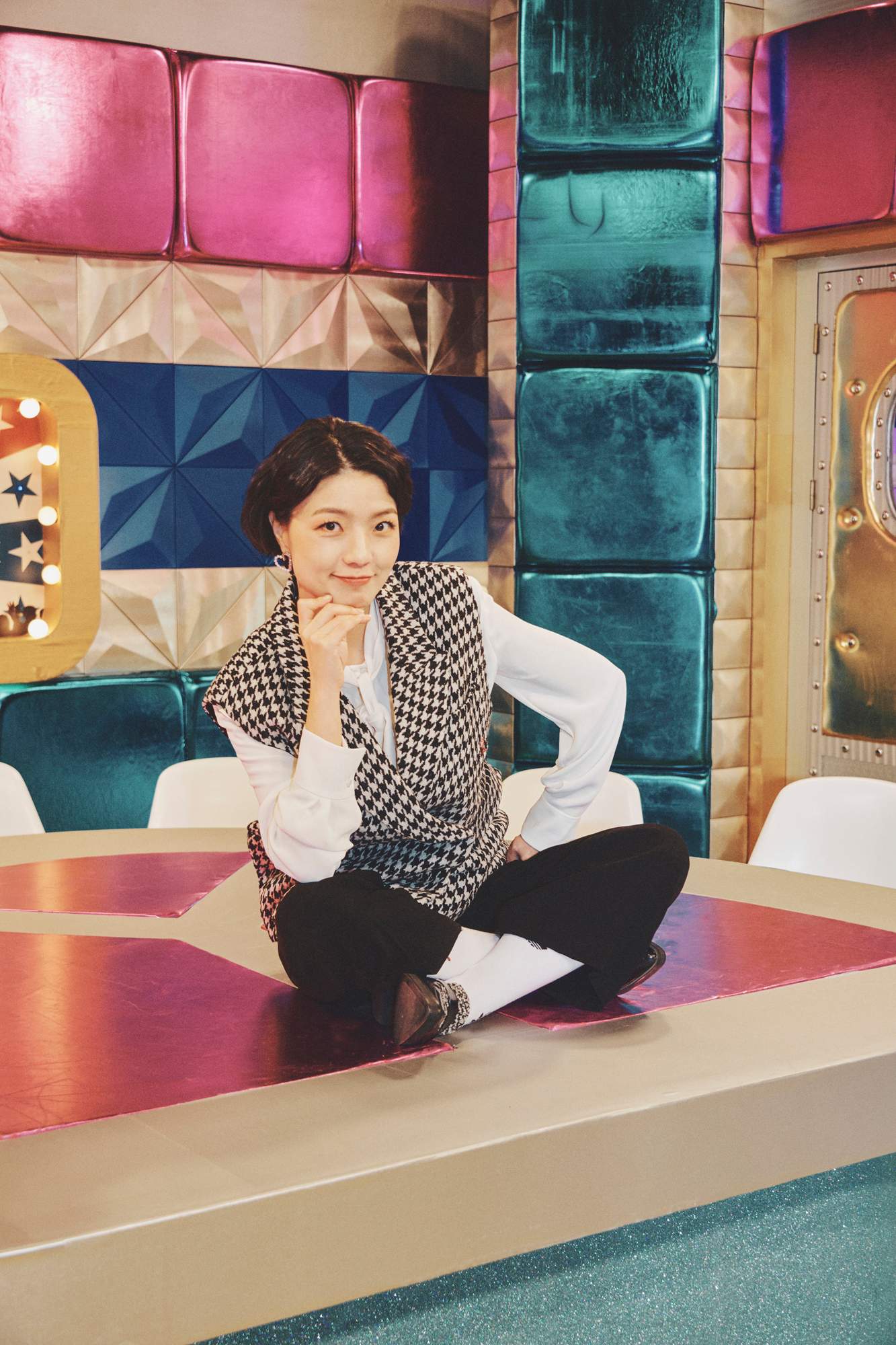
Ahn Young-mi
South Korea
The irreverent trailblazer: In a comedy scene known for its speedy turnover of talent, Ahn has spent years at the top of her game – and her star is still rising.
In a socially conservative country with unspoken rules about what is acceptable on the airwaves, Ahn Young-mi is an unabashed rule breaker. She usually appears glamorously attired but is also beloved for her skit dressed in a Gollum costume; she is as well versed in slapstick as in satire. Above all, however, her fans appreciate her refusal to tiptoe around issues. “Shin Dong-yup once told me, ‘If you’re going to shoot, you’d better make it a bullseye,’” says Ahn, quoting a South Korean comedy veteran. “If you’re spoofing politics, you have to make it crystal clear who you’re gunning for. If you try to sidestep certain things, the audience won’t find it funny.”
Ahn has been at the top for more than 10 years. As well as headlining a popular radio programme, she is the first female co-host on one of South Korea’s highest-rated TV talk shows. Last year she also made a triumphant return as a cast member of Saturday Night Live Korea. Within weeks of its premiere, Ahn was on everyone’s lips for a sketch poking fun at the ruling party’s presidential candidate’s alleged affair with an actress, whom she played.
Ahn became a household name in 2009 when she starred in a TV sketch called “Ms Kang in the Dressing Room”, which lampooned the rigid hierarchy in the entertainment industry. She played a two-faced yet loveable lieutenant who toadied to doyenne Ms Kang but ruled over her juniors with an iron fist. She and her fellow cast members were surprised by the segment’s popularity. “We thought that it was a story that only people in our industry would understand but the audience burst out laughing after practically every line,” she recalls. “The skit really resonated with the public.”
Ahn describes her high-school self as an “extreme introvert” but after getting a taste of the stage through a stint in drama club, she found her calling. “You feel this ecstasy when spectators give you their undivided attention,” she says. But recognition has also attracted viciousness online. “Sometimes you want people to leave you alone but then you start looking for comments to see whether you are relevant,” she says.
Criticism doesn’t deter her, however. Even if programmes such as Saturday Night Live Korea were temporarily cancelled because of the release of controversial online content, she believes that the public has a thirst for parody. “They used to say that young people don’t like political satire but seeing the studio audience, I don’t think we have anything to worry about,” she says. “If there is politics, we will always have satire.”
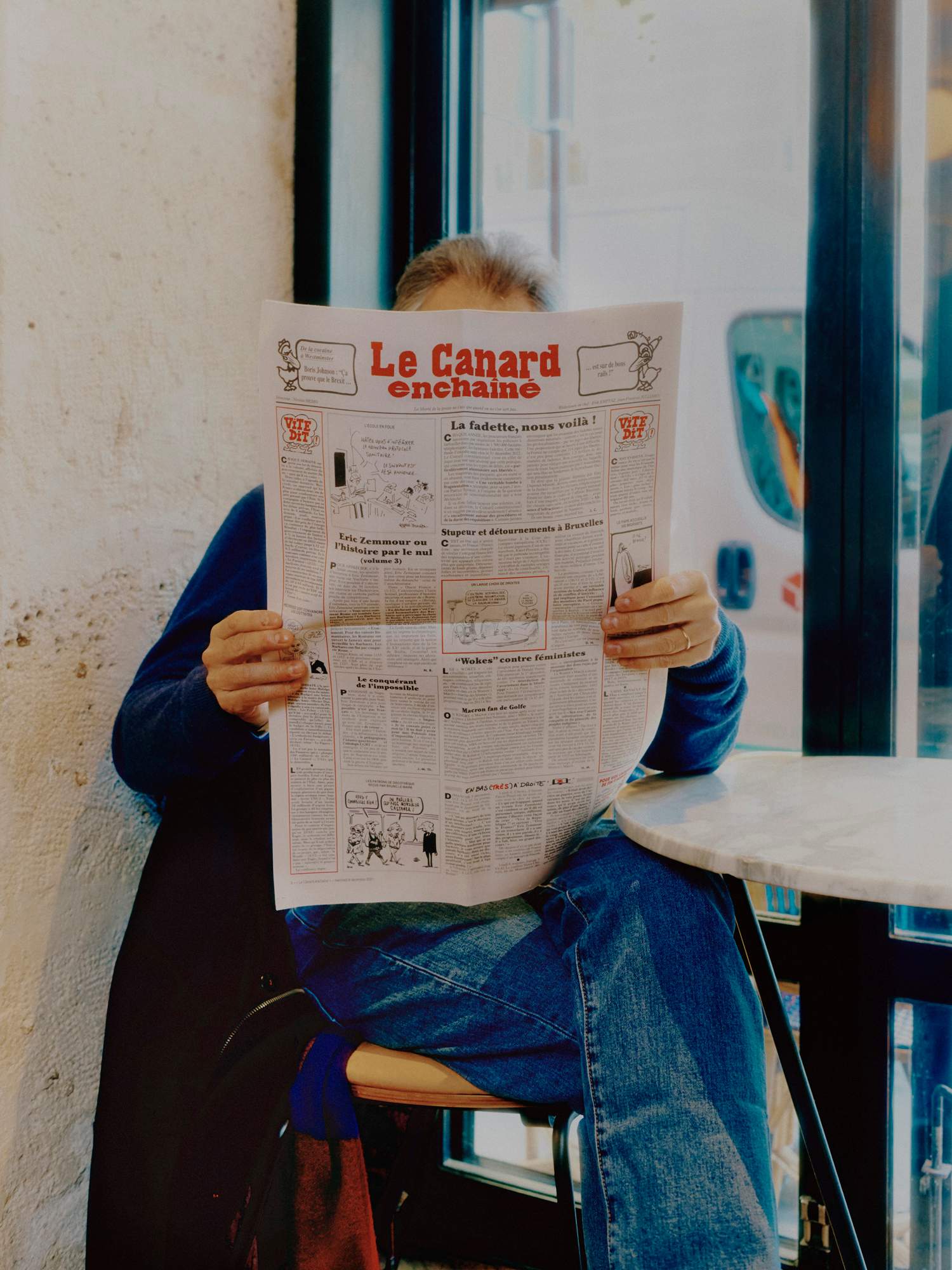
Jean-François Julliard
France
The truth teller: The editor of a storied Parisian newspaper is fighting to keep the long-established French satirical tradition alive and quacking.
For more than a century, Le Canard Enchaîné has been holding power to account. “Investigation is the basis and satire is the form,” says its editor in chief, Jean-François Julliard, who shares the role with Éric Emptaz. “The newspaper strives to tell the truth without taking itself seriously.”
Founded in 1915 as a satirical publication with an anticlerical, antimilitarist angle, Le Canard now employs about 50 staffers, plus a dozen illustrators, covering topics from defence to the environment. Some things have changed since Julliard joined the newspaper in 1985; notably, the team now includes more women. Other things have stayed the same, including the newspaper’s dedication to print and its concise nature: every issue is eight pages.
Le Canard is part of a satirical tradition that Julliard traces back to 17th-century playwright Molière. “Humour has always been a way to resolve conflict and to protest,” he says. Cartoons are integral to the paper. “There’s a French saying: a small drawing often says more than a long speech.”
Complete independence enables Le Canard to hold the French authorities in check. It is owned by staffers and all of its revenue comes from sales or subscriptions, with no advertising or state assistance. “We don’t have to worry about criticising someone who supports us,” says Julliard.
Journalists’ safety is an important consideration, which is why Julliard doesn’t want his face shown in the above portrait. France was shaken by the shooting at the offices of another satirical weekly, Charlie Hebdo, in 2015, when 12 people were killed, including renowned cartoonist Cabu, who had also been working for Le Canard. “[What happened at] Charlie Hebdo was a traumatic event but we said to ourselves, ‘The terrorists aren’t going to change how we work,’” says Julliard. “We have remained loyal to our dna.” That said, security was already being taken seriously before the attack. “There have often been threats.”
As France’s presidential election in April approaches, Le Canard has been screening candidates from both the left and right. During the previous race in 2017, its allegations that Republican candidate François Fillon had hired his wife and children for parliamentary jobs materially affected his campaign.
This time, amid concerns about nationalist candidates Marine Le Pen and Éric Zemmour, Le Canard journalists have been keeping tabs on the far right. “It’s about defending democracy, republicanism, rule of law and civility,” says Julliard of the newspaper’s role. “Some people dream of waging war on other countries or communities. That’s not what Le Canard stands for.”
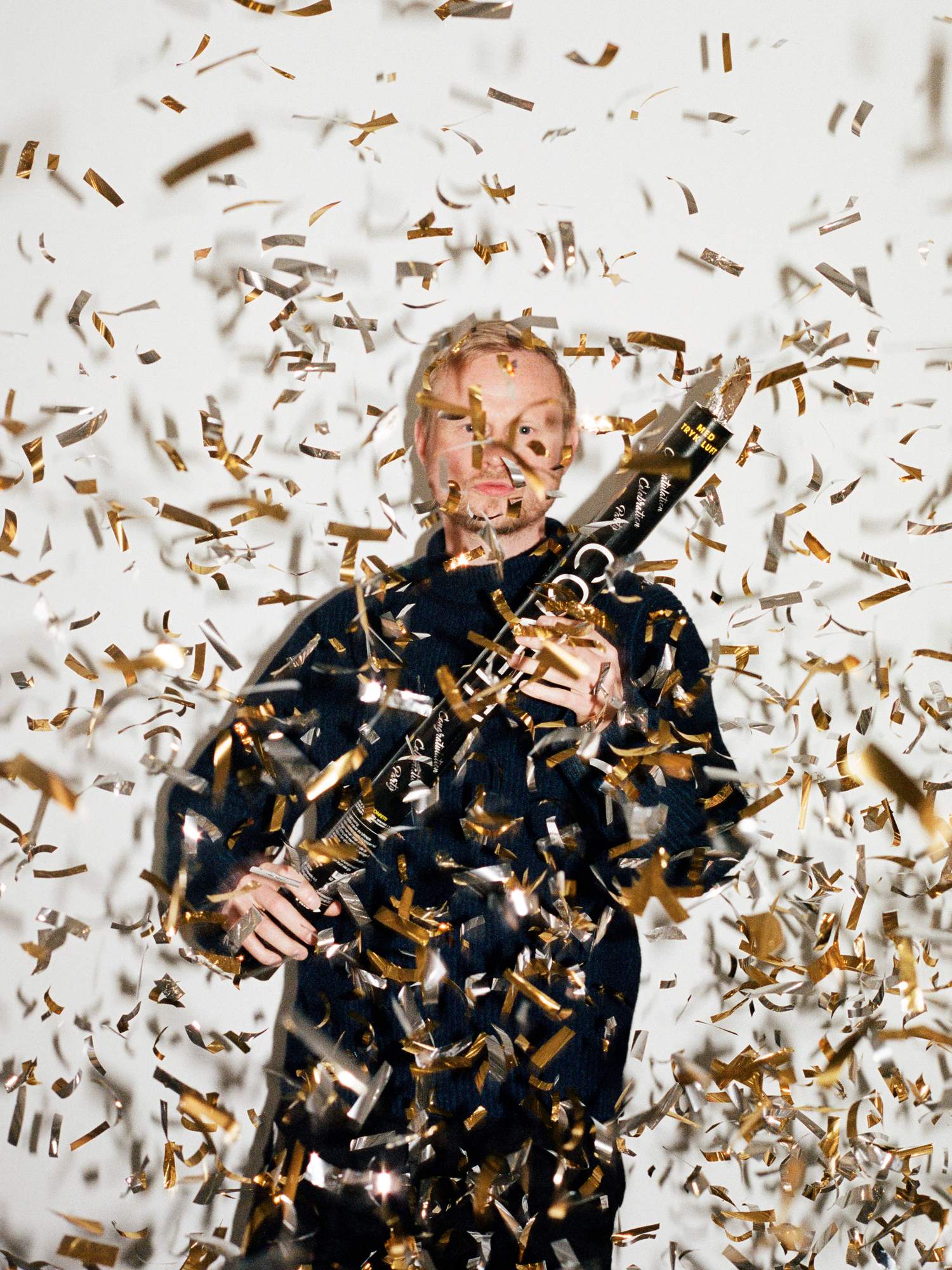
Jonatan Spang
Denmark
The cross-party offender: Taking aim at politicians across the spectrum, a Danish TV host is exposing the hypocrisies of a seemingly ideal society.
Life in one of the world’s least corrupt, most democratic countries might seem like barren terrain for a satirist but the host of Denmark’s weekly programme Taet på sandheden med Jonatan Spang (“Close to the Truth with Jonatan Spang”) insists otherwise. “We have this idea about ourselves as a model society,” says Spang in the Copenhagen offices of his production company, Small Shoes. “Politicians have to pretend that they are just like everyone else. We like to point out that hypocrisy.”
As the Muhammad cartoon crisis of 2005 showed, Danes passionately value freedom of speech; it is guaranteed in the 1849 constitution. “We can say a lot of things without being sued,” says Spang. He describes himself and his team as equal-opportunity offenders. “It’s not so interesting watching American satire because it’s clear what the political angle is,” he says. “You could edit my show to make me look left-wing, right-wing, racist or sexist. Every week someone is happy and someone is angry with me. I don’t enjoy a shitstorm but I do enjoy that the programme makes people think and feel.”
Taet på sandheden has been embroiled in many controversies. A 2018 sketch in which Spang French-kissed Pernille Vermund, the anti-Islamist leader of the New Right party, was criticised for giving her screen time. She was elected soon after. Since then, along with appearances from politicians on the left, the show has featured guests from even further right, not to mention the head of a crime family – but Spang is unrepentant. “I don’t think I have any power in that way,” he says. “For years comedians made fun of Pia Kjærsgaard [leader of the nationalist Danish People’s party] but she ended up being speaker of parliament.”
In contrast to his boisterous screen persona, Spang is thoughtful in person. “For years I struggled to find meaning in my work,” he says. “But there are many people making things sound complicated so it’s meaningful to wrap the news in humour. I still find it frustrating when I do a story about something that needs to change and then, cycling home, I feel as though there should be people in the streets with torches. Why doesn’t anything change?”
Still, Spang can be proud of his ability to galvanise an enthusiastic public. At a taping of his show, the audience welcomes him onto the set with rapturous applause. As he jokes about the poor performance of the ruling party in the local elections, it’s hard not to wonder whether he played a role after all. Eventually, Spang will probably push the boundaries of even the most tolerant Danes. Until then, he’ll keep edging closer and closer to the truth.

Élodie Arnould
France
The new-generation voice: A comedian of Malagasy heritage is redefining what comedy means and what it can do to change opinions in a divided world.
US-style stand-up comedy, which only appeared in France in the early 2000s, has truly taken off in the past few years. With the country increasingly polarised around identity issues, Élodie Arnould is one of a new generation of comedians challenging popular notions of what is funny.
“Just a few years ago you could still tell a sexist joke and expect the crowd to laugh,” says Arnould. Though still at the start of her career, she has attracted a considerable buzz with her first show, Future Grande, which launched in Lyon before moving to Paris’s Apollo Théâtre. The show, in which the 34-year-old wears a sequined jacket and a headband with cat ears, centres mostly on adulthood. But it also draws on her experiences growing up as a woman of Malagasy heritage. Her young, light-skinned son is often the butt of her jokes; at one point she riffs on the irony of a black feminist giving birth to a white male. “If the audience is very white, people sometimes don’t laugh,” she says. “But if it’s more diverse I get a good response.”
With a presidential election looming and French political debate largely dominated by the sexist, anti-migrant rhetoric of TV pundit and election candidate Éric Zemmour, many feel that jokes about stereotypes are no longer funny. “We’re at a tipping point,” says Arnould. “Some still complain, ‘We can’t say anything anymore,’ and argue that we should be able to laugh about anything, especially minorities. And then there are those who are trying to evolve. It’s always possible to joke about groups other than those who have been marginalised.”
Before discovering comedy, Arnould had a conventional career. She initially trained as an engineer in Grenoble, then worked for a utility company in Marseille. “I didn’t know anyone so I signed up for improvisational theatre classes,” she says. “I thought that it would be a fun way to meet people. I never dreamed that I would make a career of it.”
Her style of comedy combines light-hearted observations with perceptive riffs on issues that are close to her heart. In one sketch, for example, she gives her audience members advice on how to deal with climate- science deniers. “Humour brings things into the collective consciousness,” she says. “The more that we talk about these issues, the more that people will realise that some things are not OK. Humour is an enjoyable way of getting a message across.”
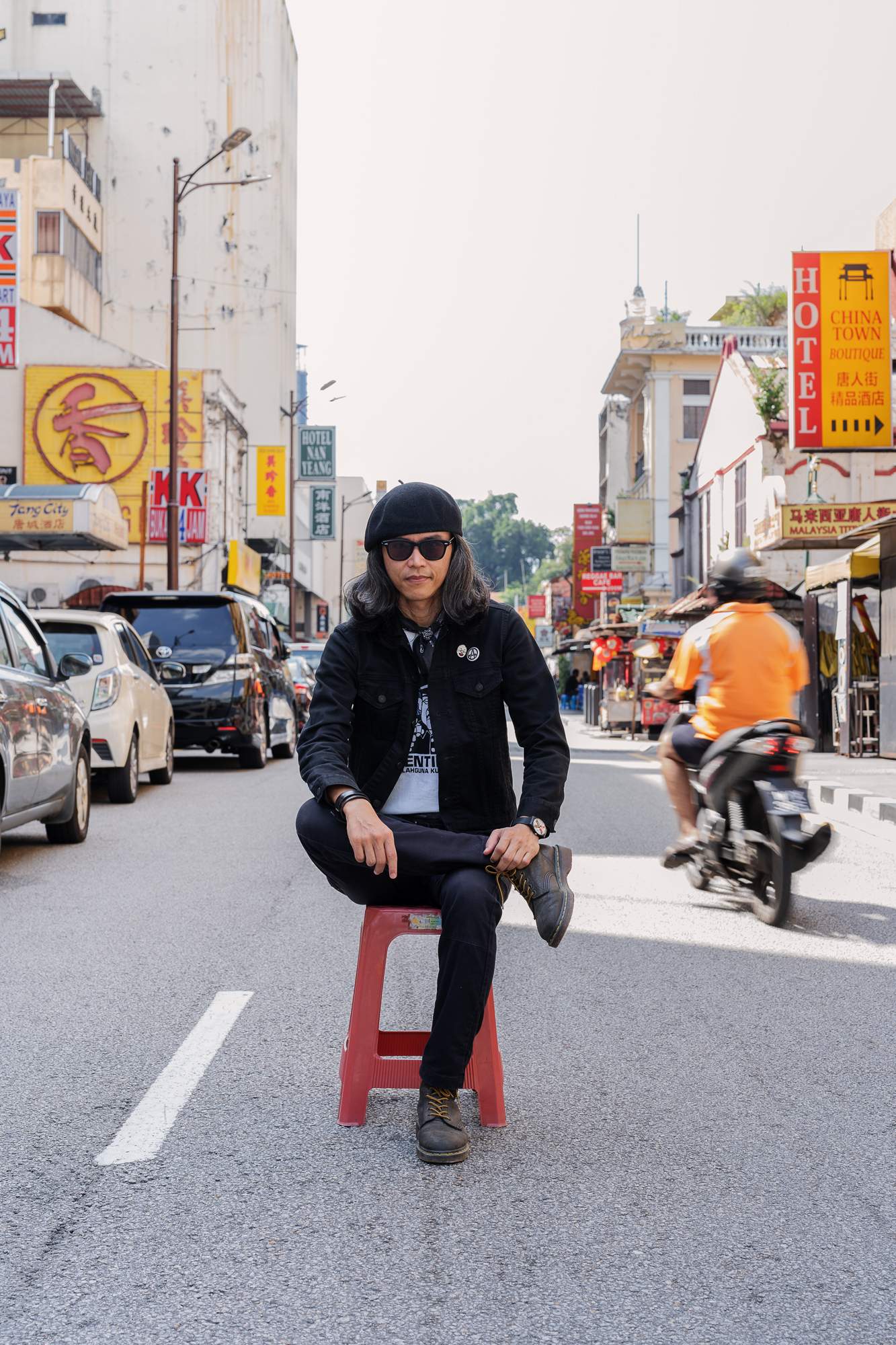
Fahmi Reza
Malaysia
The activist designer: Despite being thrown into prison, assaulted and fined, graphic designer Reza is undeterred in his mission to challenge the powerful.
When Fahmi Reza published a caricature online depicting Malaysia’s then prime minister Najib Razak as a clown in 2016 he couldn’t have predicted how far it would travel. Paired with the slogan “Kita Semua Penghasut” (“We Are All Instigators”), it became a protest symbol against corruption, in particular a money-laundering scandal in which billions went missing from the country’s state fund. It travelled abroad too, appearing as cover art for UK documentary The Kleptocrats and making a cameo in a K-pop video.
Two years later, Barisan Nasional, Razak’s party, lost the general election, ending its 60-year rule. “I played a small role in that,” says Reza, wearing a black beret and sunglasses. “One way to measure the effect my drawings have is the fact that the authorities are going after me. If they weren’t effective, they would just be ignored.”
Initially, Reza was given a one-month prison sentence and a fine of rm30,000 (€6,300) for the drawing. He crowd-funded the amount in less than a day by selling merchandise of that very artwork. He still publishes online every day and his cartoons regularly trigger legal actions, made possible by repressive laws supposedly intended to stop fake news and sedition.
In 2021 alone he was arrested twice: once for allegedly insulting the Malaysian queen by posting a satirical music playlist; the other for a Spongebob Squarepants-inspired caricature of prime minister Ismail Sabri Yaakob. The authorities might have little tolerance of his sense of humour but Reza remains undeterred. “To laugh at the people in power is how you can overcome fear,” he says.
Reza became interested in drawing and activism when he started listening to punk rock as a teenager. “It’s where I found my political consciousness,” he says. Inspired by punk’s diy spirit, he designed posters for his friends’ gigs. Eventually he branched out by volunteering for non-profits and social movements after noticing that the designs of their campaign materials weren’t up to scratch. “People didn’t even want to take the brochures home,” he says. “So I thought that maybe I could help them out.” Soon, Reza was using design as a way to share his views. In 2004 he was assaulted by the police and spent his first night in custody because of protest banners that he had made for a demonstration against police brutality. “It taught me that graphic design can be a threat to those in power,” he says.
A sense of injustice continues to motivate Reza’s work. “Everyone should be doing this in their own way to keep the powerful in check,” he says. “I just happen to be using my craft to speak out.”
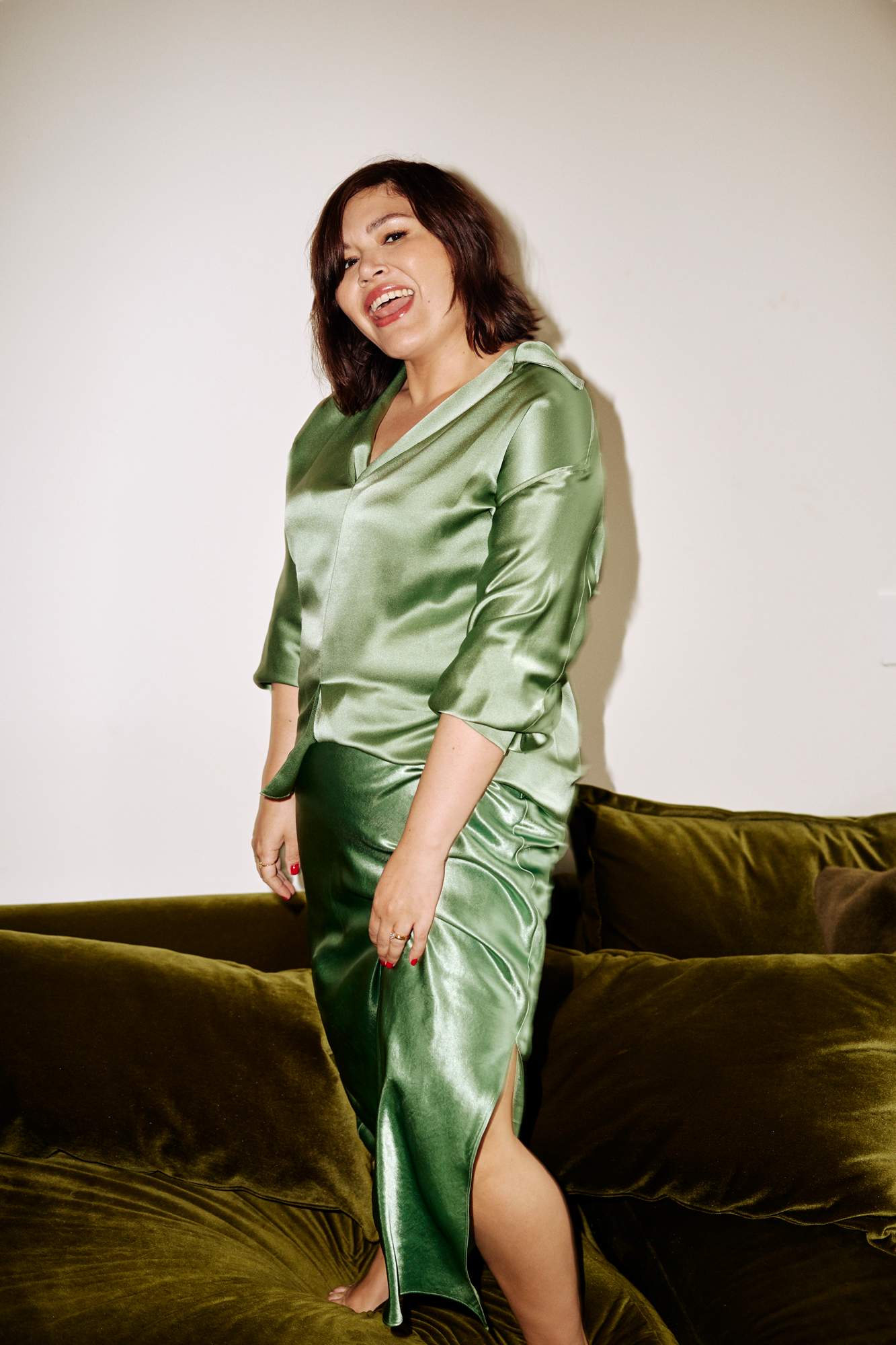
Nakkiah Lui
Australia
The myth buster: In a country where the indigenous population has long been marginalised in the media, an Aboriginal comedian is rewriting the rules.
After conquest and subjugation, the original inhabitants of a territory are often recast as figures of fun. Australia is no exception, which might be why a sketch show in which indigenous people laugh at themselves, and at the mockery and derision they have endured, has caused befuddlement.
abc began broadcasting Black Comedy in 2014 and Nakkiah Lui was one of the show’s regular cast members, writers and co-producer. “Non-indigenous people didn’t know when they had permission to laugh,” she says. “I have a lot of woke progressives in my circle of friends who were very uncomfortable engaging with some of it.”
The final season of Black Comedy aired in 2020. It was a very funny but difficult watch for non-indigenous viewers. Its sketches performed a deft jujitsu with stereotypes that are still at large. In one, a white Australian decides to see what benefits might accrue when he whimsically ticks the “Are you of Aboriginal or Torres Strait Islander descent?” box on a job application; it quickly gets extremely bleak.
“What are some of the questions we can be asking?” says Lui. “What are some of the provocations that we can throw out there that maybe can’t be discussed anywhere else without there being some huge political divide?”
Lui came to fame as a playwright, attracting acclaim and awards for 2013’s This Heaven, a depiction of the struggles of an indigenous family in Mount Druitt, the Sydney suburb where she grew up. “It was a portrayal of those tropes of black trauma that are so commodified in our entertainment industry,” she says. When articles about it started to appear, she noticed that photographers often stood her in front of graffiti-spattered walls and asked her to gaze dreamily upwards. Eventually she made a stand by turning up at one shoot wearing a faux-fur cape, “looking like the daughter of a Russian oligarch”.
As a deadpan response to attempts to enlist her as a role model or spokesperson, Lui describes herself as an “advocate for Aboriginal mediocrity”. “Oppression tends to operate in one of two ways: either you’re put on a pedestal or you’re put in the gutter,” she says. “As an Aboriginal person, as soon as you achieve any kind of success, you’re celebrated for that. You always have to go above and beyond to justify your worth.”
Lui’s latest project is Preppers, an abc sitcom that premiered in November. “It’s about a group of First Nations doomsday preppers, who figure that colonisation was an apocalypse of sorts and it would be silly not to prepare for another,” says Lui. “Colonise me once, shame on you; colonise me twice, shame on me.”

Emad Hajjaj
Jordan
The change-maker: The threat of legal action and receiving death threats from terrorist groups is part of satirical cartoonist Hajjaj’s job description.
Jordan’s best-known cartoonist ended up in his career almost by accident. In the 1980s, as a physics student enrolled at Yarmouk University in the city of Irbid, Emad Hajjaj discovered a passion for art. By the 1990s he was drawing his own vignettes and receiving national acclaim. “It was the first time that people recognised my signature,” he says.
Though that decade was marked by political tension, as a satirist Hajjaj was usually freer to criticise the country’s social issues. However, in 2000 he was dismissed from the leading al-Rai newspaper because of a controversial cartoon that he had drawn. Since then he has been freelancing for pan-Arab newspapers and publishing on social media channels. “Being a cartoonist in a country like Jordan is not an easy job,” he says.
The rise of social media has been accompanied in Jordan by state controls that effectively criminalise free speech. Hajjaj was arrested in 2020 for a cartoon about the Abraham Accords, signed between Israel and the United Arab Emirates; he was charged with “jeopardising relations with a friendly country”. The experience has made him more cautious. “I now send my cartoons to a lawyer before publishing them,” he says.
Denouncing extremism can also be a risky endeavour. Hajjaj received death threats after publishing a cartoon that condemned the Amman suicide bombings of 2005, which killed more than 50 people in the Jordanian capital. Radical groups such as al-Qaeda and Isis evidently perceived cartoons as a threat. “They are more afraid of cartoons than government statements,” says Hajjaj. The assassination of Jordanian writer Nahed Hattar in 2016, who shared a cartoon on social media, seems to confirm this – and it had a chilling effect on Hajjaj’s work. “I believe in what I do but I started to avoid cartooning about issues in Jordan. I count to 10 first.”
Still, Hajjaj believes that clear-sighted self-criticism is crucial to reforming Arab society. Slowly, traditional anti-American and anti-Israeli cartoons are making room for those tackling issues that are closer to home. “People are becoming more sarcastic,” he says. “They have a better sense of humour now and make jokes even during the saddest moments.”
If anything, the rise of misinformation and censorship has endowed cartoonists with an even greater responsibility. Hajjaj believes that most Arabic cartoonists are committed to progressive change. “As a human being, I feel more balanced when I draw about these issues,” he says.
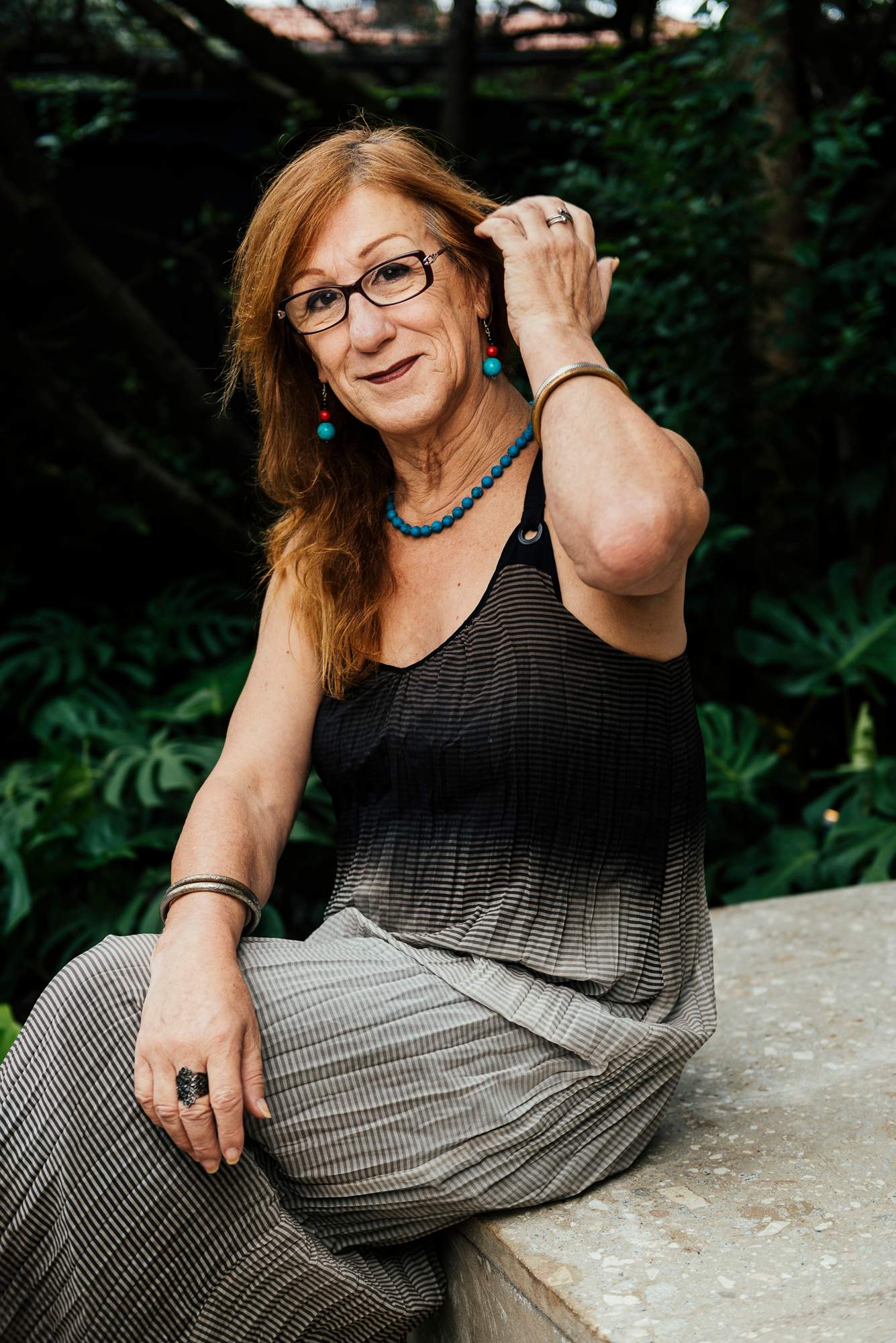
Laerte
Brazil
The national treasure: Having chronicled Brazil’s rocky path towards democracy, veteran cartoonist Laerte remains a sharp and perceptive opponent of injustice.
From superheroes to politicians, cartoonist Laerte can draw anything. Famous for her witty strips, she started out freelancing for O Pasquim, a weekly known for its criticism of Brazil’s dictatorship in the 1970s. “I didn’t think of it as a profession at first,” she says. But before long she was a household name; by the 1980s she had secured her current gig, drawing cartoons for newspaper Folha de São Paulo. Her reflections on gender, politics and the business of being alive are a part of many Brazilians’ daily routines.
Laerte has long poked fun at Brazil’s most powerful figures, including those who were part of the repressive military regime. Her work illustrated every stage of the country’s path to democracy. Yet finding the right punchline never gets easier. “I have a complicated relationship with what I do,” she says. “I constantly ask myself: what purpose does my work serve? Will people get it?” For Laerte understanding what makes others tick is a matter of civic duty. “It’s about unmasking people and situations,” she adds.
But what happens when people and situations are already shamelessly, openly absurd? Brazilian president Jair Bolsonaro has built a career out of making inflammatory comments that verge on the grotesque. As a trans woman who was recently hospitalised with coronavirus, Laerte has been personally affected by his bigotry and mishandling of the pandemic. Is there anything left to satirise? “I’ve been struggling with this,” says Laerte. “One of the country’s top comedians recently said that he thinks we should get paid moral damages for doing the work that we do,” she says, chuckling. Her savage cartoons about Bolsonaro (one of which depicts him suffocating a coronavirus patient with a pillow) are funny but leave a bitter aftertaste. “I haven’t been targeted for being critical of the current administration but others have and that possibility is always looming in the background,” she says.
Some of her other work, such as comic strip Os Piratas do Tietê (“The Pirates of the Tietê”), take a more fictional approach. Following a group of adventurers as they sail on São Paulo’s main river, the series, which debuted in the 1980s and was adapted into an animated film in 2019, remains a firm fan favourite, beloved by Brazilians of all ages.
While finding lighthearted reasons to laugh today might be tough, Laerte believes that comedy remains worthwhile. She doesn’t seem to think that there are limits to tackling Bolsonaro’s antics with humour, either. “I don’t think of humour in terms of limits, only possibilities,” she says. In this spirited fight with the president, she might well have the last laugh.
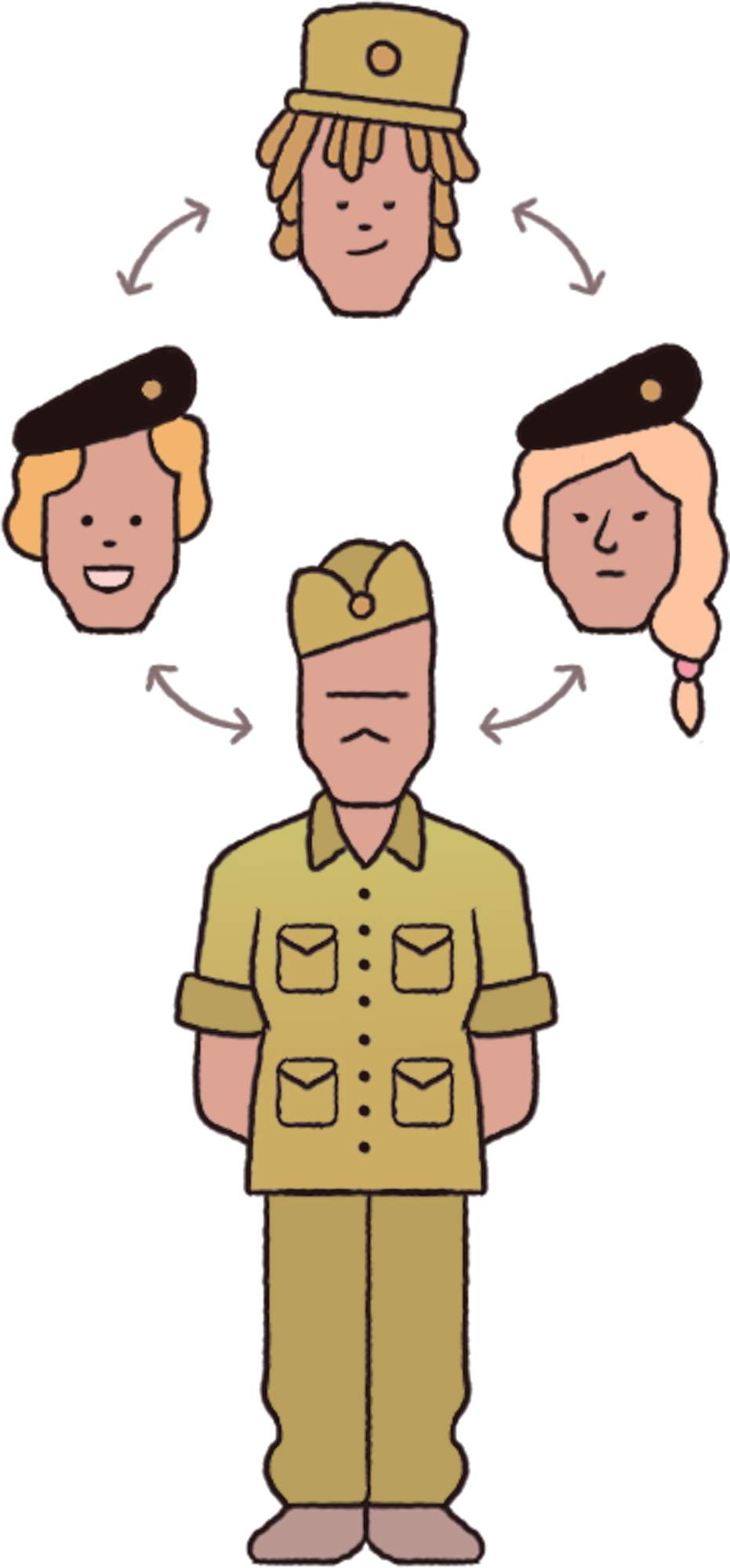
What’s funny in...
Norway
Shared experiences make for great comedy fodder, which might be why young comic Herman Flesvig’s latest project, the TV series Førstegangstjenesten (“The Military Service”) is such a hit in Norway. Conscription is compulsory in the country, so the series’ concept resonates with most age groups and recent episodes have been drawing in about 1.7 million viewers – that’s about one in every three Norwegians. On screen, Flesvig plays four of the main characters – a group of hapless conscripts who include a confused war enthusiast and a predatory female chauvinist. Hilarity ensues, yet Flesvig’s talent lies in going beyond mere caricature; he gives true depth to his characters as well as visibility to people with disabilities. One of the series’ main figures has Down syndrome and Flesvig himself has been open about his challenges with adhd, which he now treats as a creative source. Norwegians are, by and large, self-deprecating and have always laughed at characters who remind them of their less-than-perfect selves. But that humour doesn’t need to be crass and Flesvig’s talent lies in being outrageous while keeping a profound human touch.
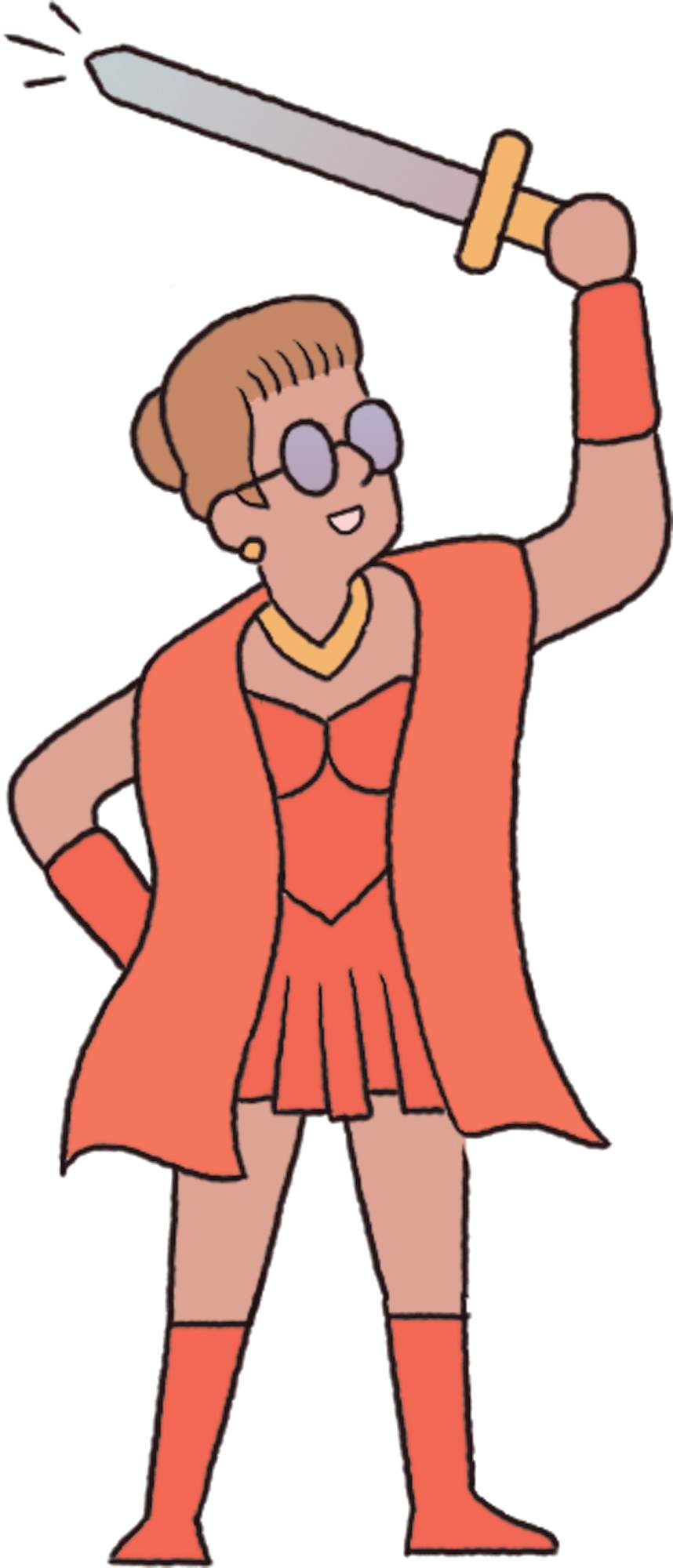
What’s funny in...
Canada
It might be tempting to assume that Canada’s often-stereotyped national tropes – gentleness, courtesy, kindness – extend to its rich comedy pedigree. Not quite, says Mary Walsh, the treasured Canadian actress and comedian who in 1993 created the country’s longest-running TV comedy programme, This Hour Has 22 Minutes, a weekly satirical spoof of a nightly newscast that’s still produced by national broadcaster cbc. Walsh is best known for pioneering one sharp-edged comic device: the ambush. She would show up at press conferences and volley her own questions at the official at the lectern and watch their responses unfold. Her targets have included prime ministers, mayors, celebrities and even royalty: the Duke of Edinburgh once declined the offer of a kiss from Walsh during an official engagement. “We have a very dark sense of humour here,” says Walsh. Canada’s vast and relatively sparsely populated national territory also plays a part in what makes the country laugh. “There’s a mystery, a darkness, an unknown quality to large parts of Canada,” she says. “We’re allowed to be more open because we have more space.”
Divine comedy
Humour and faith should go hand in hand, argues an Anglican priest and author.
by Fergus Butler-Gallie
While the merest furrowing of Ivan the Terrible’s brow was enough to instil fear in hardened warriors, one figure dared to chastise the tsar. St Basil the Holy Fool was something of a freelance comedian. As well as being the only individual able to challenge the all-powerful tsar – one prank involved Basil throwing raw beef at him – he indulged his passions for shoplifting and wandering the snowy streets of Moscow, wearing nothing but a chain.
Times have changed. As a clergyman, were I to indulge in naked shoplifting, I would be out of a job before you could say, “That’s probably a blessing.” Yet the fracture in the church’s once healthy funny bone goes deeper. The church, once home to humourists of every type – from satirists like Jonathan Swift to masters of the scatological, such as Rabelais – seems to have lost its sense of humour. Clergy today are associated with either stern, stentorian moralism or a po-faced pseudo-niceness.
That’s a shame. A sense of humour is one of the only things that keep me going in my ministry. Not taking everything deadly seriously is an essential part of what I hold to be the work of a priest. And the reputation for humourlessness is unearned. Some of the funniest people I know are clerics; these include experts in filthy jokes, joyful celebrators of the human condition and purveyors of dark gallows humour.
Part of the dynamic of clerical humour is the fact that it is the job of a priest to see and engage with the full panoply of human nature. That is often heart-warming and sometimes deeply tragic. But more often than not, it is joyously ridiculous. Seeing the preposterousness of humanity up close so regularly makes it impossible to take one’s own personality too seriously.
At the heart of Christianity is a message of liberation and there is nothing more liberating than laughing. Seeing humour in the ups and downs of existence is not only a coping mechanism for members of the clergy but also a theological statement. By laughing at ourselves, we make clear the imperfection of humanity and proclaim the possibility of its redemption.
Laughter is neither a judgement of irredeemable shortcomings, nor an endorsement of perfection. It is the most authentically Christian response to the human condition. A belief in divine providence is the perfect set-up for the knowing smile; there are times when I have blustered or cursed at a particular state of affairs, only for a reminder of the beauty of creation to raise a smile.
That I know myself to be laughable makes my priesthood a greater privilege than if I thought otherwise. A sense of humour brings me closer to what I recognise as the divine. An acceptance of the ridiculous deepens my faith. After all, a faith that could only find glory in the cold and logical would soon grow stale and, as St Basil the Holy Fool knew, there is great prophetic power in the proper deployment of the absurd.
It is my hope that the church might rediscover its talent to amuse and resurrect the spirits of St Basil, Swift, Rabelais et al. Humour, after all, is a gift from God. We would be positively ungrateful not to make use of it.

What’s funny in...
Australia
Irreverent and dry. These are words that describe the Australian sense of humour and are key tenets of the country’s national identity. They’re also words that can be used to describe The Betoota Advocate, Australia’s most popular satirical website, which takes aim at national leaders with headlines and stories that cut through political noise (“Christian Porter MP Resigns From Federal Politics to Spend More Time With His Lawyers”), while also satirising daily life down under (“Relative With Pool Selfishly Refuses to Host Christmas”). Founded by two former journalists who work under pseudonyms and in character as reporters in the fictitious city of Betoota, which is named after an actual outback ghost town in the state of Queensland, the publication is quick to respond to breaking news with its own satirical take. In doing so, The Betoota Advocate has become an integral part of the media landscape in Australia, with readers turning to it not for news but because it keeps its finger on the pulse of Australian politics and life while also keeping alive the nation’s comedic sense of self.
A brief history of the death(s) of satire
Over the years, surreal developments in current affairs have periodically inspired experts to announce that satire was no longer able to outdo reality. Andy Borowitz of ‘The New Yorker’ provides a brief review of several times when satire was declared dead – and why it’s anything but.
by Andy Borowitz
Year: 1973
Status of satire: Dead
Death declared by: Tom Lehrer
In the 1960s, Tom Lehrer, a US writer and performer of satirical songs, was popular on both sides of the Atlantic: the bbc banned 10 of the 12 songs on his first album, thus guaranteeing huge UK record sales. In 1973, however, Lehrer announced that the genre he was famous for was finished. “Political satire became obsolete when Henry Kissinger was awarded the Nobel peace prize,” he said. Lehrer never wrote another song and Kissinger never won another Nobel, though he was nominated many times for a war crimes trial in The Hague.
Year: 1980
Status of satire: Dead again
Death declared by: People who noticed that Ronald Reagan was US president
The election of Reagan, a widely mocked former B-movie star who was out-acted by a chimp in 1951’s Bedtime for Bonzo, impelled many observers to declare satire dead again. Robin Williams, however, was unwilling to sign its death certificate. “People say satire is dead,” he told Rolling Stone. “It’s not dead; it’s alive and living in the White House.”
Year: 2001
Status of satire: Really dead
Death declared by: Graydon Carter
After September 11, Graydon Carter, co-founder of satirical magazine Spy, announced, “It’s the end of the age of irony.” A little while later, however, when it became clear that irony hadn’t gone anywhere, Carter tried to backtrack. “Only a fool would declare the end of irony,” he said. “I said it was the end of the age of ironing.” Good news: satire was alive. Bad news: so were puns.
Year: 2016
Status of satire: Incredibly dead
Death declared by: Google
The election of Donald Trump in November 2016 finally killed satire forever. Proof: if you google “Trump” and “satire is dead” you get about 1,490,000 results. By comparison, “Reagan” and “satire is dead” yields only 16,700, while “Kissinger” gets a paltry 2,200. Clearly, when so many people utter the same journalistic cliché it has to be true. But wait! In 2019, cnn’s Christiane Amanpour asked British satirist Chris Morris if satire was dead. “Anyone who says that is basically handing in their cards,” said Morris. “They have given up. They have essentially told the world that their imagination has ceased to function properly.” With these words, Morris settled the matter. The death of satire is officially dead.

What’s funny in...
Japan
Respect matters in Japan’s hierarchical society. People rarely challenge its spoken or unspoken rules, no matter how ridiculous; neither do they make fun of their bosses, elders or strangers. But to cope with these strictures you occasionally need to let loose and comedy is key. Hitoshi Matsumoto of legendary duo Downtown has become a national icon by providing that relief. The 58-year-old subverts and skewers social norms and rages at daily annoyances that most wouldn’t dare to verbalise, from robotic customer service to elderly women causing delays at the airport. Matsumoto also talks about his own cringe-inducing experiences, making his audience confront sensitivities around the prized ideal of dignity. His sketches deliver anecdotes that are so embarrassing that they generate empathy; after all, Japanese audiences wouldn’t enjoy a ruthless roast. Matsumoto has also made films with an altogether wackier kind of humour. In one of his comedies, Symbol, he plays a pyjama-clad man who wakes up in a white room whose walls are covered in buttons. When pressed they elicit peculiar events, such as unleashing a flock of floating Kewpie dolls.

What’s funny in...
Brazil
When global audiences think of Brazilian cinema, they might picture crime thrillers such as City of God. But Brazilians themselves are fond of comedy: the most successful film at the country’s box office is 2019’s Minha Mãe é uma Peça 3 (“My Mum is a Character 3”). It stars late comedian Paulo Gustavo, who died of coronavirus last year, playing Dona Hermínia, a sweary but loving mother to Marcelina and Juliano, who is gay and soon to be married. The character was inspired by Gustavo’s own mother and the plot relates to the comedian’s experiences as a gay man. In a political context that has been openly discriminatory towards homosexuality, Gustavo captivated an audience that spanned all sectors of Brazilian society, from conservatives to liberals. There’s no controversy to the film, only warm, easy comedy that united a nation. Gustavo encapsulated Brazilian humour in how he combined slapstick with astute observations on Brazilian society – cue the scene when Dona Hermínia is stopped at security in a US airport for carrying too many painkillers, poking fun at the stereotype of Brazilians as incurable hypochondriacs.
The essence of satire
Here, a Tehran-born British stand-up comic, actor and writer explores the difference between comedy and satire, and draws a line between the genuine stifling of free speech and the failure of unfunny material that’s just provocative for its own sake.
by Shaparak Khorsandi
“The comedian tries to distract the crowd and make people look at him or her, while the satirist makes them look at themselves.” That’s the best way that I’ve heard the difference between satire and comedy described.
My comedy career began when I was eight years old. I performed impersonations of politicians. In the 1980s my parents – who, like many Iranians in London, had been exiled after the revolution of 1979 – were glued to the news. I wasn’t interested in politics but learned that comedy was the best way to get the attention of the adults in my life. I still want to make people laugh, regardless of whether I have a point to make. I am a comedian.
My father, however, is a satirist. His lampooning of the ayatollahs was what led to our exile. In 1984, Scotland Yard foiled an attempt by the Islamic Republic of Iran to assassinate him outside our London home. After the fuss died down, my father went straight back to work, which in his case meant writing jokes that made powerful people want him dead.
When I was upset by a few internet trolls early in my career, he chuckled and said, “Just trolls? You must work harder. None of them wants to kill you yet!”
Yet there are people who believe that satire consists of anything that some might find offensive and that their abrasive remarks should therefore be considered intrinsically comedic. Social media has given voice to “free-speech” warriors who loudly blame “cancel culture” for the fact that their jokes aren’t landing and for the supposed injustice that they’re not being invited onto comedy panel shows or the latest unmissable series of Celebrity Sock Darning.
The reality is that if you insist on doing or saying things that audiences find unpalatable, you won’t endear yourself to television or radio producers, either. Demand is what drives supply, after all, and that is nothing new. It’s not cancel culture; it’s just show business. A plumber wouldn’t moan, “I’m not getting any work because I keep flooding houses. I’m not a bad plumber; I’m controversial and too edgy for mainstream plumbing.”
Comedians who blame “cancel culture” for their failure to get career breaks are not the same animal as those satirists who risk their lives by exercising their freedom to speak. Real satire humiliates the powerful but speaks the language of the public.
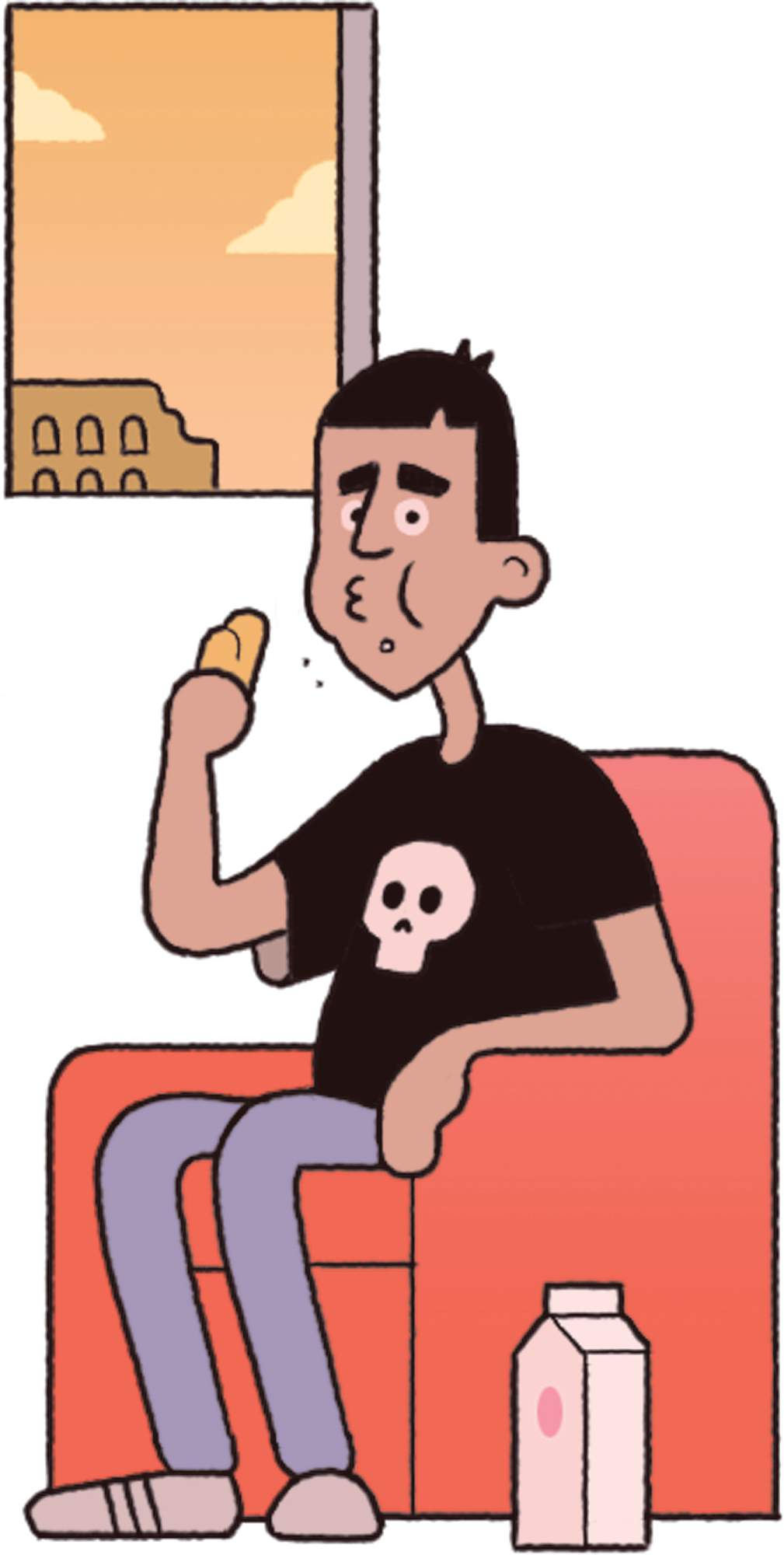
What’s funny in...
Italy
The intricacies of party politics and coalition dramas have given plenty of material to Italy’s satirists over the years. But what’s making the country laugh of late is away from Rome’s parliamentary chambers and closer to the city’s northern suburbs. Cartoonist Zerocalcare grew up in the district of Rebibbia and started publishing his work online in 2011, mocking details of daily life in strips where a furry-browed version of himself would try to teach his overbearing mother how to use a computer, while also tackling tougher topics such as anti-fascist protests and the G8 conference. Since then, Zerocalcare’s work has become more confessional but no less funny. But one theme has remained constant for Italy’s bestselling cartoonist: chronicling the confused lives of a generation without a “conventional” sense of purpose, jumping between temporary jobs. His recent animated Netflix special, Strappare Lungo i Bordi (“Tear Along the Dotted Line”), finds him, as usual, anxiously sat on his sofa discussing responsibility and friendship with his own conscience (personified as a judgemental armadillo) and having the nation in stitches – and sometimes tears – in the process.
Going native
British comic James Mullinger explains why moving to a tiny Canadian town with no comedy club was the best thing he ever did for his stand-up career.
by James Mullinger
After 16 years as a journalist and stand-up comedian in London (don’t worry, I haven’t heard of me either), I moved to a town with a population of 10,000 on the east coast of Canada. On paper, I had an enviable life in the UK, interviewing celebrities and performing stand-up in clubs most nights. But other than a very small, loyal following, I was unknown. Some of my friends had gone from gigs in pubs to playing arenas but that ship had sailed for me. I needed a change.
Tony Soprano once said, “There isn’t a geographical solution to an emotional problem.” But like so many of Soprano’s life lessons, this is grossly incorrect. Moving to a smaller place made me happy and gave me a whole new act. It also, against all odds, made me far better known in Canada than I had been at home.
In the UK I was just another white, middle-class male comic joking about drinking, sex and my wife and children. But if you move to a place where there aren’t many people like you, you become a novelty with something fresh to say. Our job as comedians is to notice things, so to be a fish out of water is the dream.
To others, moving to one of the only places in North America without a comedy club seemed insane but to me it made sense. It afforded me the opportunity to forge my own path: I simply had to go out and perform anywhere that would have me – churches, schools, dive bars, vineyards, basements, gardens – and if people liked it, they would tell their friends. I arrived in Canada in 2014 with no contacts and no following whatsoever. By 2016 I had performed to a sold-out crowd of 5,000 at a hockey arena. The show was filmed for an Amazon Prime Video special and led to a TV show.
Now, I have no idea if this would work everywhere. Canadians are intrinsically celebratory; they are scarily nice; they really like people emigrating to their country; and when they enjoy something, they tell people. To this day I spend very little on advertising. In their kindness, Canadians do the work for me.
Canadians can also take a joke. I have never felt that I have to hold back in my ribbing of their strange ways. If I put Brits through what I put Canadians through in my act, they would have forcibly sped up my own personal Brexit. Because of the country’s smaller population, I rely on people coming to see me four or five times a year, which has forced me to become prolific in my writing. But I’m really just a glorified ventriloquist; repeating things they have said that I find strange or weird or funny. In any other country, that would be deemed rude. But in smalltown Canada, they love you for it.

What’s funny in...
Argentina
Anyone who has lived in Argentina will tell you that getting your head around even the simplest financial transaction requires skill. Inflation, price controls, separate exchange rates, the “blue” black-market dollar – lost you yet? Understanding money after successive economic meltdowns has become almost an inside joke and comedians are increasingly incorporating finance into their punchlines. Buenos Aires-based Andy Olivera co-produces videos to convey this shared sense of economic despair. His latest, “The Dollar Goes to the Moon”, has been viewed two million times. Using footage of mission control from the film Apollo 13, the video features a Spanish voiceover running through a pre-launch checklist ahead of lift-off: “Investment?” “Zero.” “Country risk?” “Through the roof.” “Small businesses?” “Bankrupt.” “Inflation?” “Rising.” And so it goes on until the dollar is ready for departure. Olivera thinks that part of the success of his comedy is down to culture. “We’re big criers and big laughers,” he says. “Like laughing out loud at a funeral, comedy serves to distract from the reality that things are actually pretty bad.”
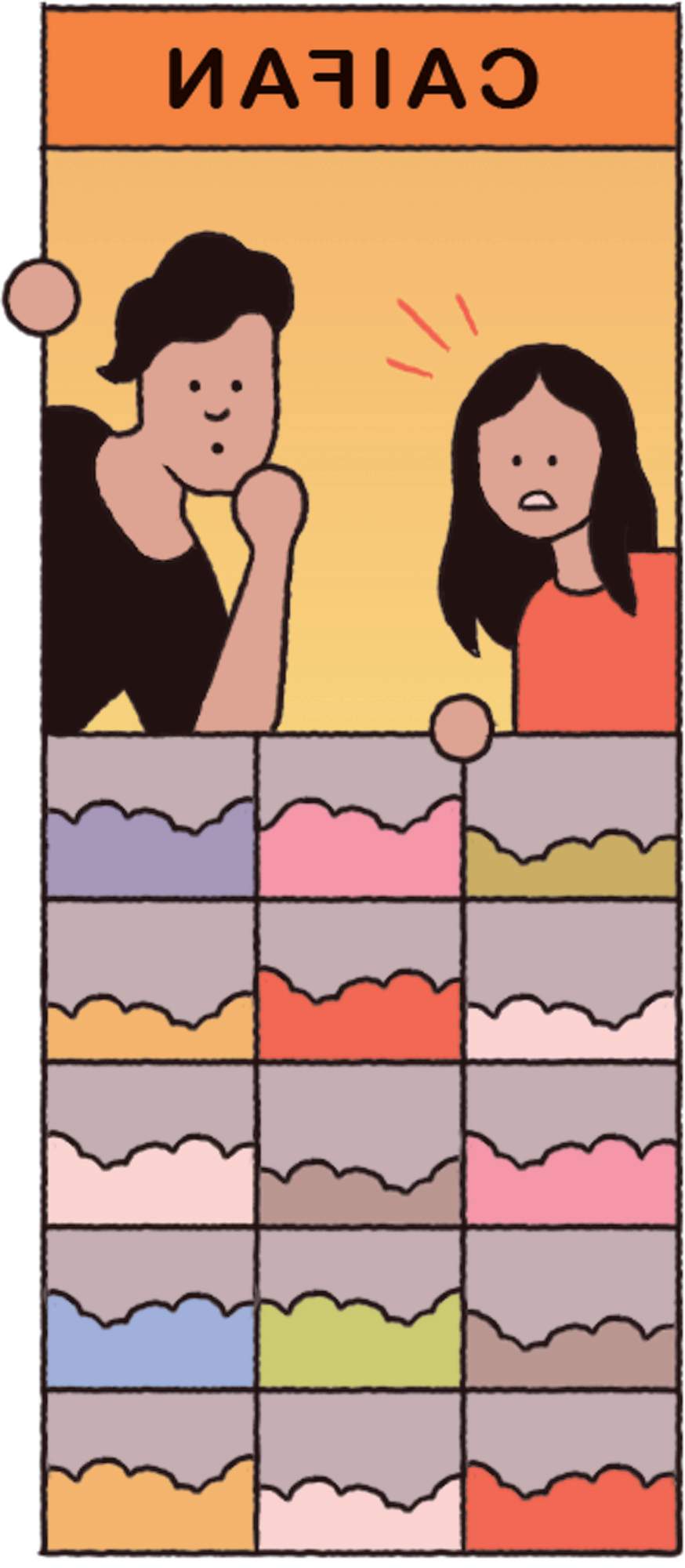
What’s funny in...
Singapore
Singaporeans might live in quite a rule-abiding society but they still know how to laugh at themselves. Musician-actors Benjamin Kheng and Annette Lee have recently struck a chord with their new comedy video series The Ann & Ben Show. In it they rib idiosyncratic Singaporean traits, from people’s obsession with bubble tea to an Asian parent’s way of showing “affection” through corporal punishment, or the anxiety that strikes when ordering cai fan (economy rice) from a hawker stall that serves a wide array of dishes. Kheng and Lee have turned mundane moments into songs punctuated with pop-cultural references, pairing their wit with an unbridled use of Singlish, the city-state’s unofficial tongue (a creole that draws from languages and dialects including Malay, Tamil and Hokkien). The Singaporean government has traditionally taken a dim view of the vernacular, in the belief that using “proper” English is crucial to the country’s position as a global economic hub – but the success of The Ann & Ben Show underscores Singlish’s staying power. An audience keen not to take themselves too seriously awaits a second season with bated breath.
Photography: Raffael Waldner, Anna Nielsen, Benjamin McMahon, Pyo Kisik, Julien Lienard, Dennis Morton, Stephanie Füssenich, Paulius Staniunas, Charles Dennington, Sarah Nasser, Filipe Redondo.
Illustrator: Giacomo Gambineri


